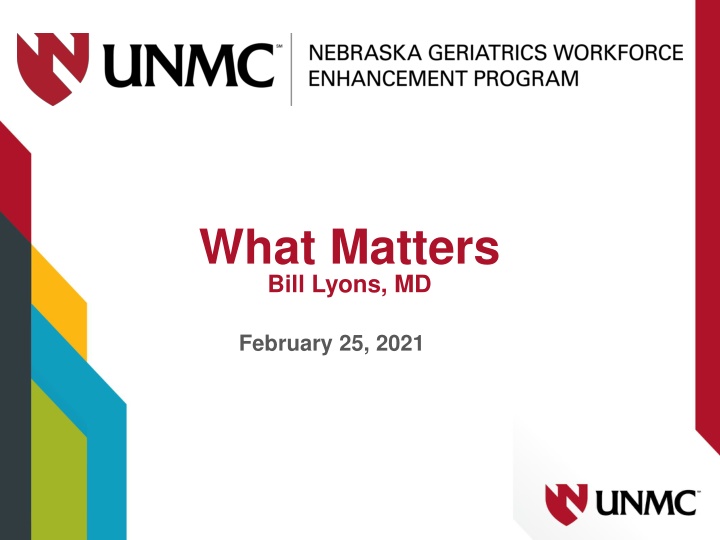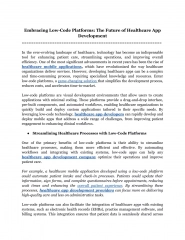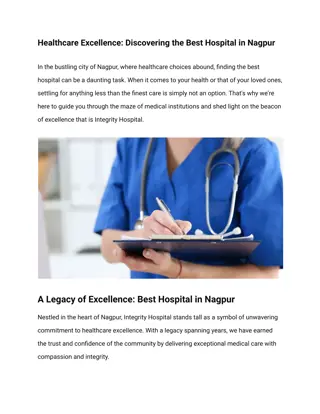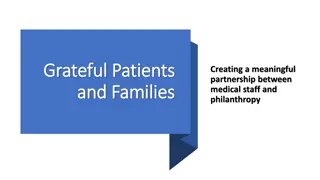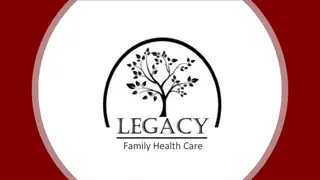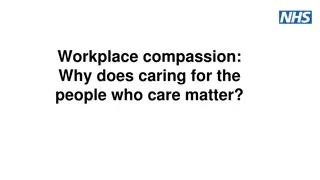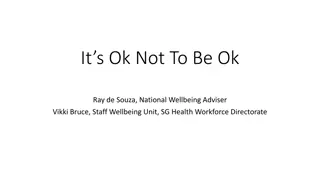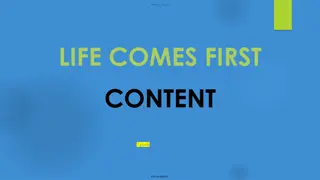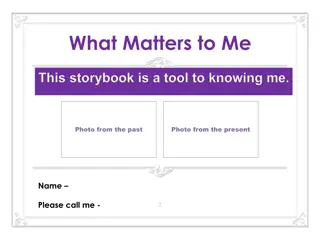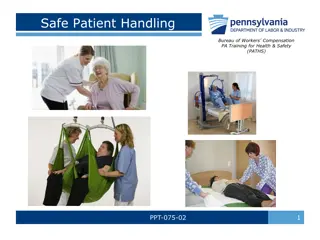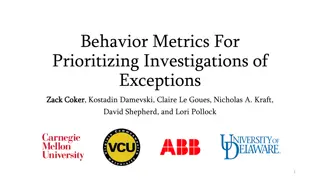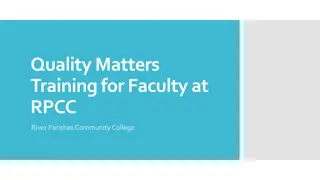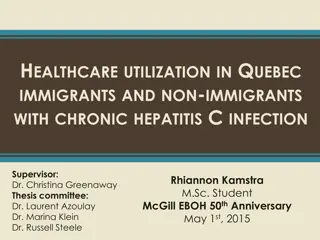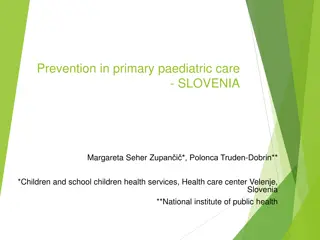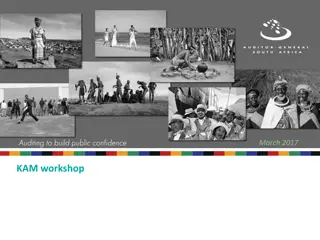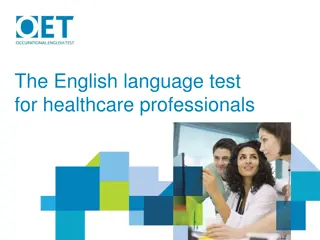Prioritizing What Matters in Healthcare: A Comprehensive Approach
Focusing on what truly matters in healthcare involves aligning care goals, optimizing medications, maintaining mobility, promoting mental acuity, and fostering collaboration. Advance care planning, identifying patient priorities, and eliciting what matters are crucial components for enhancing patient-centered care and managing complex health needs effectively.
Download Presentation

Please find below an Image/Link to download the presentation.
The content on the website is provided AS IS for your information and personal use only. It may not be sold, licensed, or shared on other websites without obtaining consent from the author.If you encounter any issues during the download, it is possible that the publisher has removed the file from their server.
You are allowed to download the files provided on this website for personal or commercial use, subject to the condition that they are used lawfully. All files are the property of their respective owners.
The content on the website is provided AS IS for your information and personal use only. It may not be sold, licensed, or shared on other websites without obtaining consent from the author.
E N D
Presentation Transcript
What Matters Bill Lyons, MD February 25, 2021
This program is supported by the Health Resources and Services Administration (HRSA) of the U.S. Department of Health and Human Services (HHS) as part of an award totaling $751,695.00 with 0% financed with non- governmental sources. The contents are those of the author(s) and do not necessarily represent the official views of, nor an endorsement, by HRSA, HHS, or the U.S. Government. For more information, please visit HRSA.gov.
What Matters Focusing on What Matters Most means looking at the goals of our care, coordinating advance care planning, and making sure priorities and preferences that are important to us individually become part of our treatment plans. Medications Focusing on Medications means raising awareness about potential side effects while also working to reduce the number of medications we take whenever we can. Mobility is the term for being able to move freely on our own or with help. Mobility is linked to staying physically fit and being able to live on our own for as long as possible, which makes it one of the most important Ms of geriatrics for our health, safety, and independence. Focusing on Mobility means maintaining our ability to walk or stay balanced while also avoiding falls and other types of common injuries. Mentation Staying mentally sharp and managing mental health can help us live longer and hopefully healthier lives. That s why expert attention to the Mind one of the Ms of geriatrics and age-friendly care is such an important part of our well-being. Focusing on the Mind means supporting our brain health and managing unique conditions like dementia, delirium, and depression, which can affect our ability to think clearly and make decisions.
Collaboration helps us all achieve more Methods to collaborate: Attend, Participate, Provide Feedback Please note your attendance in the CHAT by entering Name, Role, E-mail address During discussion: Please unmute yourself to contribute and ask questions. Following each session, complete surveys and provide feedback
COUPLE OF GREAT RESOURCES prepareforyourcare.org Rebecca Sudore et al Advance Care Planning patientprioritiescare.org Tinetti, Blaum, Naik, et al Priority setting in multimorbidity, good for ACP as well
ACP AND ELICITING WHAT MATTERS Similar and related activities ACP, by definition, is about planning for the future ACP entails Identification of surrogates Elicitation of What Matters Yet eliciting What Matters is helpful in the here and now of managing multimorbid patients
MEET RENEE 40 yo woman is an elementary school art teacher with hyperlipidemia and hypothyroidism. Recently remarried, she has an 8-month old son and 5-year-old daughter. A chest film incidentally discovers a 2-cm RUL mass; pathology shows adenocarcinoma. What are your next steps in her care?
MEET MILDRED 85 yo woman is a retired elementary school art teacher with advanced parkinson disease, related dementia, HFrEF (last EF 20%), frailty. Widowed, her son and daughter reside out of state with their families. Resides in an ALF. A chest film incidentally discovers a 2-cm RUL mass; pathology shows adenocarcinoma. What are your next steps in her care?
CARE FOR MANY OLDER ADULTS WITH MULTIPLE CONDITIONS MAY Be of uncertain benefit Few older adults in RCT s Those who are don t look like Mildred These persons have less benefit from treatment than those in the studies Be burdensome Inflict unintended harm Be frustrating Hence the need for determining What Matters
ADVANCE CARE PLANNING Is a process, not just a form or document Involves Reflection Sharing
KEY DECISIONS INVOLVED IN ACP Choosing a surrogate Articulating What Matters Most (Maybe) Clarifying strong views about medical interventions CPR Intubation Dialysis Artificial nutrition and hydration Etc.
SET UP THE CONVERSATION Thinking in advance hope for the best, prepare for the worst Benefit for patient and family No decisions necessary today, but Is this OK?
CHECK THEIR UNDERSTANDING (Not always necessary) What is your understanding now of where we are with your illness? I know we doctors may not always do the best job of communicating about these things Calibrate their understanding as needed
PROGNOSIS (Not always necessary) (May provide rationale for: Why now?) Share prognosis as a range, tailored to information preferences How to estimate? Experience Contact consultant if a prominent disease eprognosis.ucsf.edu
REALISTIC EXPECTATIONS OF ACP Can t expect the process or document to cover every possible situation or decision Better to spend time clarifying desired (vs undesired) way of living than Checking a selection of boxes on menu of possible interventions
CHARACTERISTICS OF A GOOD SURROGATE Reasonably available Can understand and represent patient s particular goals, values, preferences Even if they don t agree with them! Can make decisions in difficult moments
CHOOSING THE SURROGATE Can t just pick one need to have a heart-to- heart talk Patient should think about and clarify how much flexibility (if any) to grant the surrogate
WHAT MATTERS: GOALS What things are most important in your life? Examples: Function and independence living on your own, caring for yourself Longevity Social connection friends, family, religion Symptom relief Have you changed your mind about what matters in your life? (Say more )
GOALS, cont. What would you be doing more of if your [ailment] were not so burdensome? (Probably better for current multimorbid management than for ACP) What activities are particularly important or meaningful?
GOALS, cont. Describe what a good day would look like Which relationships or connections are most important to you? What brings you the most enjoyment or pleasure? What do you hope your health care can do for you?
WHAT MATTERS: BURDENS Are these aspects of your health care making it difficult to meet your goals Medicines (pills, shots, drops, inhalers) Self-care tasks (diet, FSBG checks ) Blood tests and x-rays, etc. Medical visits Dialysis What are you willing/able to do, and what NOT?
WHAT MATTERS: FEARS AND WORRIES What are your biggest fears and worries about the future with your health? What experience have you had with serious illness? What went well? What didn t? Why? In the same situation, what would you want?
FEARS AND WORRIES, cont. Can you imagine anything that would be worse than death? Or, Can you think of any health situations that would be hard on your quality of life? Some people might say Not being able to live w/o machines Not being able to think for oneself Not being able to live on one s own Constant pain
SCENARIO TO CONSIDER Sudden event has left you unable to communicate You re receiving all care needed to keep you alive Doctors believe little chance you ll recover ability to know who you are or who you re with Would you want Medical treatment to keep you alive, or To stop the medical treatment (You d be kept comfortable in any case)
WHAT MATTERS: FUNCTION What abilities are so critical to your life that you can t imaging living without them?
WHAT MATTERS: TRADE-OFFS If you became sicker, how much are you willing to go through for the possibility of gaining more time? I ve had some patients who have told me, Doc, I want you to do anything you can to have me live as long as possible surgery, breathing machines, you name it . And I ve had other patients .
